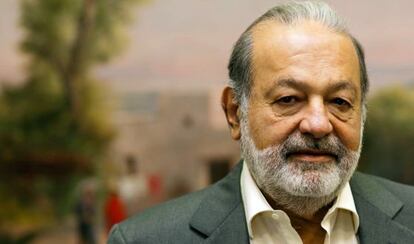“It is time to make some adjustments to this welfare state”
Mexican magnate Carlos Slim gives his view on Europe's crisis


At 72 years of age, Carlos Slim Helú's agenda is very tight, and even before one meeting has ended the next group starts gathering around his table. In this interview about the European crisis, granted jointly to EL PAÍS and its five partners in the Europa project (The Guardian, Le Monde, La Stampa, Süddeutsche Zeitung and Gazeta Wyborcza), the Mexican business magnate argues that Europe's welfare state has become unsustainable. He says adjustments must be made to ensure that unemployed people get retrained according to future labor needs, supports pushing back the retirement age and suggests work schemes where older workers put in fewer days a week but more hours per day.
Slim, founder and honorary chairman of the business conglomerate Grupo Carso (Telmex, América Móvil, Sears Mexico and others) and declared by Forbes magazine the wealthiest person alive since 2010, has this piece of advice for Europeans: "What Europe must do is two things: sell assets to reduce its debt and deficit levels, and also invite the private sector to make the kinds of investments that the state no longer needs to make."
Question. You recently stated in an interview: "You read the numbers, and the numbers tell you what's going on." So what do Europe's numbers tell you? What's happening there?
Answer. [...] The main reason for what is happening now is that, after World War II, governments established an increasingly larger welfare state that has become unsustainable. It is necessary to make some adjustments to this welfare state. They need structural changes, but you can see that these are not being undertaken, and that instead [governments] are resorting to the traditional recipe of adjusting the fiscal deficit through higher taxes or lower public spending. In this welfare state, people are retiring at 60 in some places, when the life expectancy of someone who reaches 60 is probably 85 or more, and expected to go higher. There are universal health programs that are very important but not very efficient and often open to tourists. That's when you start having a health insurance that does not obey normal causes, but where you have tourists abusing the conditions to use medical services, accessing surgeries and prosthetics by going to the country that offers them for free. The worst thing that is happening now, and in this case the numbers speak most eloquently, is the huge amount of unemployed people, especially among the young. From the social, economic and general point of view this is a matter of great concern for Europe. Yet you don't sense that anyone's thinking about a solution to this. It is no longer important whether GDP grows one or two points more or less. In any case per capita income continues to be high, and there will not be a regression to pre-developed levels. The really serious issue is that jobless rates are very high, and that the recessive policies being followed are only making the problem worse.
In the knowledge society, it is sad that people stop being employed at 60"
Q. What structural changes to the welfare state are required?
A. The retirement age must be higher, because in the past societies required more physical exertion; in the industrial society you had to be there at your machine, you had to work physically and it was very exacting. Now we have service societies where the main thing is not physical strength or physical work, but experience and knowledge. In the knowledge society, it is sad that people stop being employed at 60, when they are in their prime.
Q. You would be retired, too?
A. Oh, long ago! That is absurd. In the knowledge society, the people with the greatest experience and knowledge are under-utilized because they are left out of a job. I think retirement should come much later. I would say 70 just to provide a figure, keeping in mind that people are going to live to 85 and beyond. On the other hand, I think we must of course seek to maintain universal health coverage, but a more efficient, intelligent one, with better oversight, avoiding abuse. There must also be social protection networks at the proper level, and retirement programs must pay people to go into retraining. That is to say, if I'm out of a job, instead of just getting 1,000 euros, yes, I'll get them but first I have to join a retraining program in "x" number of activities where there's going to be job demand, not in activities where there is already no demand. It is very important for governments, and specialists above all, to analyze where the new jobs are going to be in the next five to 10 years, in order to train people for those jobs as of now, and encourage activities where those jobs are going to be created. You can also develop work programs, especially in the case of Europe, with work formulas where people work three or four days a week. Instead of five eight-hour days, you could work three 11-hour days. The three or four remaining days of rest could be used for reading, entertainment, family life, cultural activities, education, traveling...
Instead of five eight-hour days, you could work three 11-hour days"
Q. It's a cultural change.
A. We are experiencing a complete change of civilization with new paradigms, and what we need to do is make the structural changes that this requires. The changes must be made. It is not possible to think that 50 percent of young people are unemployed, or even 30 percent or 25 percent. It is not possible to think that the welfare state will continue to grow while reducing the retirement age for people. Unemployment compensation plans must be associated to retraining to ensure that people who are jobless now will be trained in other activities. The better prepared a person is, the greater the chances of getting a better offer and finding a job. Four decades ago, [futurist writer] Alvin Toffler talked about the crises provoked by the changes in civilization. What's happening now in Europe, and the world in general, is a crisis caused by a change of civilization. By increasing productivity, by being more efficient, by going global, by no longer being competitive in the production of certain goods, you start to see these types of problems that require deep changes if you are really going to resolve them. And speaking of numbers, the numbers don't add up to hold these welfare programs together. If you do the math and see the cost of retiring the economically active population, it becomes unsustainable. So what you have to do is make those adjustments, and of course offer people something in return: individuals will work more years but fewer hours during probably the last 15 years of their working lives, or maybe the last 10, or perhaps the last 20. This allows for a fuller life. Because in the end, what combats poverty is work, having a satisfactory job, which also brings dignity to people; employment is not just a social responsibility, it is also an emotional need.
Global society, this must be made very clear, is a services society"
Q. Looking at it through the eyes of an investor, where are the opportunities in Europe right now? In which sectors?
A. Europe will go through some difficult times, but it will have to find the solutions and continue developing. There are activities that will generate more jobs, because they will be more intense and broad in scope. One of these is information technology, it's an attractive field, it has a future. Of course the health industry will be very important as an investment; education, entertainment, elderly caregiving, tourism... The moment things are corrected, all these activities are going to generate jobs. These would be interesting investments for people in Europe and the world; they are going to be in growing demand, drawing more investment, more economic activity and more jobs. Global society, this must be made very clear, is a services society.
Tu suscripción se está usando en otro dispositivo
¿Quieres añadir otro usuario a tu suscripción?
Si continúas leyendo en este dispositivo, no se podrá leer en el otro.
FlechaTu suscripción se está usando en otro dispositivo y solo puedes acceder a EL PAÍS desde un dispositivo a la vez.
Si quieres compartir tu cuenta, cambia tu suscripción a la modalidad Premium, así podrás añadir otro usuario. Cada uno accederá con su propia cuenta de email, lo que os permitirá personalizar vuestra experiencia en EL PAÍS.
¿Tienes una suscripción de empresa? Accede aquí para contratar más cuentas.
En el caso de no saber quién está usando tu cuenta, te recomendamos cambiar tu contraseña aquí.
Si decides continuar compartiendo tu cuenta, este mensaje se mostrará en tu dispositivo y en el de la otra persona que está usando tu cuenta de forma indefinida, afectando a tu experiencia de lectura. Puedes consultar aquí los términos y condiciones de la suscripción digital.








































